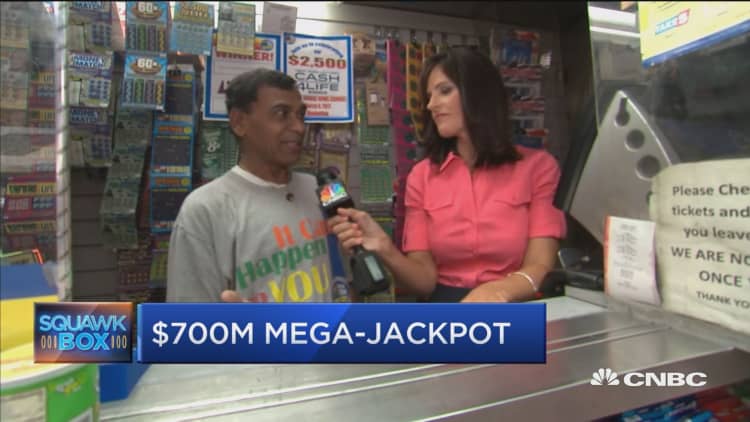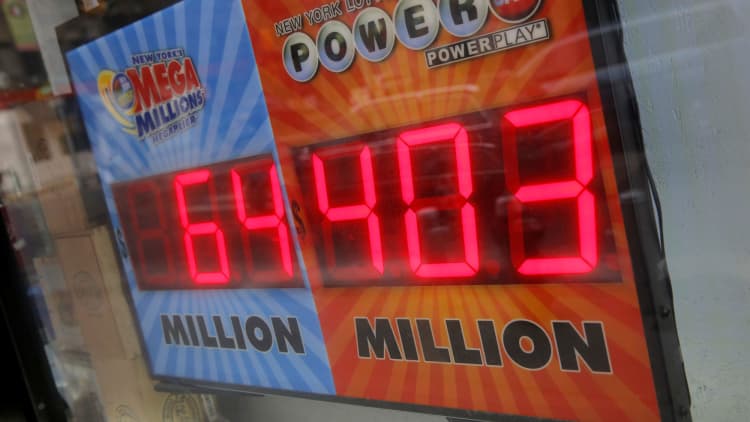
Got Powerball fever? Then carefully consider where you buy your ticket. Location matters, if you're lucky enough to win.
The Powerball jackpot is now $700 million, which makes it both the second-largest prize in the game's history and the second largest in U.S. lottery history. The next drawing is at 10:59 p.m. ET on Wednesday (tonight).
If you decide to pick up a last-minute ticket, it's not unusual that you might have a choice of locales in which to make that purchase. More than a quarter of U.S. workers commute outside the county where they live, according to Census Bureau data, and in five states plus Washington, D.C., 1 in 10 workers live in a different state. Or maybe you're on vacation.
Wait until you get home from work to buy that lottery ticket.Melissa Labantdirector of tax advocacy, American Institute of Certified Public Accountants
Per state lottery regulations, you must claim the ticket in the state where you purchase it.
"That can make a big difference," said Jason Kurland, a partner at Certilman Balin Adler & Hyman in East Meadow, New York, who is known as the Lottery Lawyer.
Here's why:
State taxes
Should you win the jackpot, a chunk of federal and state taxes are automatically withheld based on where you bought the ticket (see infographic below).
What you want to avoid is buying a ticket in a locale where the tax rate on lottery prizes is higher than that of where you live, said Melissa Labant, director of tax advocacy at the American Institute of Certified Public Accountants. At tax time, you'll get a credit in your home state for taxes paid to other states, but your total state tax bill will reflect the higher rate.
For example, let's say you live in New Jersey but work in New York City. New Jersey withholds 8 percent, while New York City withholds 12.7 percent (including an 8.82 percent state tax and an additional 3.876 percent in city/local tax), according to lottery site USAMega.com. Buying a ticket at the convenience store outside your office instead of the one near your house could cost you as much as an extra $20.8 million in taxes on the jackpot's $443.3 million lump sum.
"Wait until you get home from work to buy that lottery ticket," Labant said.
Let's say you buy a ticket in a state that doesn't tax lottery prizes, or has a lower tax rate than your home state. You'll still pay taxes based on your home state's rate, Labant said. With less withheld up front, you may need to plan more carefully to make sure you can meet your tax obligations come filing time.
According to USAMega.com, nine Powerball-participating states don't tax lottery prizes (California, Delaware, Florida, New Hampshire, South Dakota, Tennessee, Texas, Washington and Wyoming). Two more — Arizona and Maryland — have different tax rates on lottery prizes for residents and nonresidents.

Claiming strategy
Some states make it easier than others to stay anonymous, which experts typically advise to avoid the publicity deluge and financial "asks" from family, friends and strangers that inevitably follow a big win.
Only five states currently allow winners to claim a ticket anonymously, said "Lottery Lawyer" Kurland: Delaware, Kansas, Maryland, North Dakota and Ohio. If you have an easy ability to buy a ticket in one of those states, that's worth considering.
The rest of the states vary in their claiming rules; something that's worth strategizing with an attorney before you claim the prize, said Josh King, chief legal officer of legal services marketplace Avvo. You might be able to set up an LLC or trust to protect your identity.
"Those strategies aren't completely immune to someone digging through records and figuring out who's behind the trust," King said. "But they can make it tough to find you."


